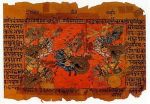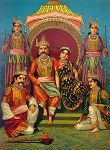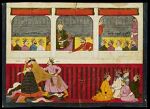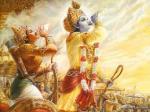Just like ‘Ramayana’, the epic of ‘Mahabharata’ also has many management lessons for the present day business leaders and managers. Greed, jealousy, quest for power, trying to achieve goals irrespective of the fairness of the means deployed – all these contradictions in life are very poignantly brought out.
Here are some lessons which could be drawn from the epic.
When it comes to announcing a successor to his vast kingdom, King Bharata does not choose any of his own sons. Instead, he names Bhumanyu whom he considers more capable to manage the affairs of his kingdom. In a dynastic rule, seeds of democracy are thus sown.
Bhumanyu whom he considers more capable to manage the affairs of his kingdom. In a dynastic rule, seeds of democracy are thus sown.
In India Inc’s power rankings, professional CEOs are on the rise. Three of the top ten in the 2013 edition of ‘India Inc’s Most Powerful CEOs’ are professionals. Five years back, K V Kamath was the only professional in the top ten.
In a reversal of an openly declared of Infosys, Chairman N R Narayana Murthy recently stirred a hornet’s nest by insisting on bringing his own son as a team member. Only time will tell if the decision pays off; as of now, seniors in the company are a bit shaken up with the move.
For his father Shantanu’s happiness, Bhishma swears never to marry. Throughout his life, he remains committed to the kingdom of Hastinapur. Despite his difference of opinion with Dhritarashtra and Duryodhana, and despite his obvious fondness for the Pandavas, he leads a vast army against the latter. However, his conduct is very transparent; he openly tells Duryodhana that though he is fighting for Kauravas, he shall not harm any of the Pandavas.
On the flip side, Bhishma also sets the example of a senior professional who overstays his welcome!
Many organizations have deeply committed silent performers who stick by it irrespective of the business ups and downs being faced. Business houses which follow a healthy set of values do end up attracting more such professionals whose value systems match with their own. In times of crisis, such people tend to be pillars of strength for the company. However, there could be situations when they need to be taken on board merely as advisors and not as executors, so younger blood in the organization also gets a chance to prove its mettle.
- Failures are Stepping Stones
Bhishma abducts three sisters – Amba, Ambika and Ambalika – to get them married to Vichitravirya. However, Amba claims she is already in love with Salva and cannot accept anyone else as her life partner. Eventually, she is rejected by both Bhishma and her own ex-lover Salva. She takes this failure as a challenge and ends up being born as a person of mixed gender –Shikhandi – in King Drupad’s family. Eventually, he/she becomes the cause of Bhishma’s death in the battlefield.
Those who take their failures as a challenge have the capacity to introspect. They identify their weaknesses and take steps to excel in areas in which their arch rival is strong. Ultimately, victory is theirs.
- Promises are like Babies!
Just like babies, promises are easy to make but difficult to keep. When they are studying together, Drupad, a prince, and  Dronacharya, a commoner, become good friends. Drupad light-heartedly tells Dronachrya that once he grows up to become a king, he would be happy to share half of his kingdom with Dronacharya. However, once they grow up, Drupad reneges on his statement and even mocks Dronacharya in his court. The result is life-long bitter rivalry between the two which spills onto the battle field, with Dronachrya on the Kaurava’s side and Drupad on the Pandava’s side.
Dronacharya, a commoner, become good friends. Drupad light-heartedly tells Dronachrya that once he grows up to become a king, he would be happy to share half of his kingdom with Dronacharya. However, once they grow up, Drupad reneges on his statement and even mocks Dronacharya in his court. The result is life-long bitter rivalry between the two which spills onto the battle field, with Dronachrya on the Kaurava’s side and Drupad on the Pandava’s side.
CEOs who promise a promotion merely to achieve short-term results often find that the promotee eventually reaches his level of incompetence at lightning speed, embarrassing all concerned. Smart HR honchos never make promises which they know cannot be kept. Same goes for marketing wizards who fear a severe backlash from customers should the product not live up to the latter’s expectations.
Contrast the behavior of King Bharata to that of Dhritarashtra. He has an obsessive attachment to his evil son. He permits the Pandavas to proceed to Varnavat where, by his son’s evil designs, they are persuaded to stay at a house constructed of inflammable materials. He allows a deceptive game of dice, making the Pandavas lose their part of the kingdom. In his presence, Draupadi, his daughter-in-law, is insulted in his royal court. Bhishma, Vidur, Krishna and several others attempt to persuade him to rein in the unbridled ambition of his son Duryodhana, but to no avail. The result is a terrible war leading to devastation of the kingdom.
CEOs who promote their sycophants without assessing the overall welfare of an organization get doomed likewise.
Multi-tasking is a buzzword in professional circles. But Arjuna displays a kind of concentration which involves a complete focus on  the task at hand. In the process, he evolves into an excellent archer of his times. Whether it is the bird whose eyes alone he is able to see before shooting his arrow, or the rotating fish whose eye he has to pierce based on the image cast in the water urn placed below in the court of King Drupada, he excels in accomplishing the task at hand.
the task at hand. In the process, he evolves into an excellent archer of his times. Whether it is the bird whose eyes alone he is able to see before shooting his arrow, or the rotating fish whose eye he has to pierce based on the image cast in the water urn placed below in the court of King Drupada, he excels in accomplishing the task at hand.
Managers who look satisfied with their day’s work would invariably share the same secret with you – of having done something satisfactorily that day! Aiming for perfection, they are at least able to excel in the tasks at hand. And focusing on one thing at a time surely helps!
Notice the kind of setbacks Pandavas get to suffer in their lives. They survive the insidious designs of their Kaurava cousins at Varanavat. After losing their kingdom and wealth to Kauaravas in an unfair game of dice, they undergo an exile for twelve years in forests. This is followed by a year of remaining incognito, which they do so in King Virata’s palace. When a peace proposal gets discussed with Kauravas, Yudhishthira offers to settle the dispute between the brothers by being content with ownership of five villages only. Even this gets turned down by Duryodhana.
The tenacity of bouncing back in the face of adversity that Pandavas display is worth emulating. Many MNCs are put off by the way the Indian market is skewed – with a miniscule share of the well-heeled who have global exposure and a vast majority of common people who aspire for reliable products and services at highly discounted prices. GE and Nestle have learnt their lessons. McDonald’s, KFC, Domino’s, Pizza Hut and Café Coffee Day in the fast food business have also sharpened their teeth by offering mouth-watering menus in the range of INR 44-119!
The mother of Pandavas, Kunti, delivers a master stroke by getting Draupadi to accept all the five brothers as her husbands. The result is a whole unified family which goes through its trials and tribulations as a single unit. Each of the brothers has a USP – if Yudhishthira is the epitome of virtue upholding ‘dhrama’ (righteousness) at all costs, Bhima and Arjuna are great warriors who have to be kept on a tight leash, impatient as they are in extracting revenge from Kauravas. Nakula and Sahdeva have their own unique qualities. Together, the five brothers form a multi-skilled and invincible team.
Large conglomerates like Tatas often sound similar in their overall configuration. Each company within the group’s fold has a unique place in the market. Each is headed by a stalwart who is a subject specialist in the field. The companies operate in fields as disparate as salt and software. Yet, all of them are connected by a common value system and a similar business philosophy.
Juggling between five husbands is no mean task and Draupadi appears to handle it rather well.
In what are euphemistically known as “matrix” organizations these days, reporting to several bosses at the same time could be a  challenging experience. One has to learn to balance each boss’ expectations against those of others. Much depends on their relative seniority or clout in the company, based on which one could handle the situation. Of course, it does not pay to pitch one of the bosses against the other, whether directly or indirectly!
challenging experience. One has to learn to balance each boss’ expectations against those of others. Much depends on their relative seniority or clout in the company, based on which one could handle the situation. Of course, it does not pay to pitch one of the bosses against the other, whether directly or indirectly!
When Indrapastha is built, Pandavas rule in a fair and just manner. They do not stray from the path of righteousness, thereby winning the love and affection of their subjects. They rule for thirty-six years before falling prey to an unfair game of dice.
Excellence in governance is a vital condition for a business leader to command respect amongst his team members. Taking good care of people is an important part of governance. The HR initiatives taken by the Tata group after The Taj Mahal Palace Hotel was targeted in a terrorist attack on November 26, 2008 in Mumbai, go on to show how well the company cares for its employees.
In the Yaksha episode, Yudhishthira is asked as to which of his four brothers he would wish to be brought back to life. He chooses Nakula. When queried, he justifies his choice by explaining that of the five of them, three (himself, Bhima and Arjuna) were born to Kunti and two (Nakula and Sahdeva) to his father’s second wife, Madri. Since he is alive, Kunti is only partially bereaved. Likewise, let Madri also be partially bereaved – hence his choice of Nakula. Pleased at this, Yaksha revives all the four remaining brothers.
Being impartial does not come easy to a leader. However, this is indeed the mark of a true statesman.
Karna faces humiliation at the hands of Pandavas for not being born in a royal family. Duryodhana realizes his potential as an ally and immediately comes forward to confer kingship upon him. They become life-long friends. Karna’s loyalty towards Duryodhana is so strong that even after realizing that he is the eldest of the five Pandavas, he chooses to fight against them, for Duryodhana.
Here is an example of unflinching loyalty to a boss!
India has a great tradition of real men displaying not only their macho side, but also their effeminate and softer side. The great  warrior Arjuna spends a whole year incognito in King Virata’s palace, disguised as the eunuch Brihannala, teaching music and dance. One of his pupils, Princess Uttara, ends up becoming his daughter-in-law who gives birth to Parikshit who eventually inherits the kingdom when Pandavas decide to retire.
warrior Arjuna spends a whole year incognito in King Virata’s palace, disguised as the eunuch Brihannala, teaching music and dance. One of his pupils, Princess Uttara, ends up becoming his daughter-in-law who gives birth to Parikshit who eventually inherits the kingdom when Pandavas decide to retire.
There is increasing realization amongst corporates in contemporary times to encourage females to assume leadership roles. Companies like Diageo, Cadbury, Coca Cola and others are making conscious efforts in that direction.
Bringing a better gender balance at the board level is the current buzzword. Leading businessmen are hiring icons of the stature of Deepak Parekh, G M Rao, Mukeeta Jhaveri and a host of others to mentor women who can shoulder board level responsibilities in the days to come.
When a decision has to be taken as to who should lead the Pandava army in the war, Yudhishthira first consults Sahadeva, the junior most brother.
This approach has several spin-offs. It instills enthusiasm and self-confidence in the younger managers. If the seniors are consulted first, others may not be able to speak with freedom, and even honest differences of opinion may get construed as disrespect.
In a careful reading of the major turning events in the whole narrative, Krishna emerges as an eminent strategist. He keeps Draupadi’s frustration under check. He knows that Kauravas would never agree to let Pandavas have their share of the kingdom in a peaceful manner. Yet, he himself goes to plead their cause so that peace is given a last chance.
In the battle that ensues, he virtually leads the 7 divisions of Pandavas’ army to a decisive win against the 11 divisions of Kauravs’  army. The manner in which Krishna persuades a demoralized Arjuna to take up his arms by enunciating the basic principles of life in the Bhagavad-Gita is exemplary.
army. The manner in which Krishna persuades a demoralized Arjuna to take up his arms by enunciating the basic principles of life in the Bhagavad-Gita is exemplary.
One of the basic concepts enunciated by Krishna in the Bhagavad-Gita is that of the everlasting nature of the soul. The concept of a soul now finds a resonance even in modern management literature. In ‘The 8th Habit’, Stephen Covey urges professionals to pay heed to their ‘inner voice’. While proposing the whole person paradigm, he speaks of the four dimensions of a person – spirit, body, heart and mind.
Coming back to ‘Mahabharata’, all mighty warriors on the Kauaravas’ side fall with specific inputs from Krishna. In case of Bhishma, Arjuna attacks him standing behind Shikhandi. Dronacharya is misled to believe that his son Ashwatthama has fallen at the behest of Krishna. When Duryodhana appears to be invincible in his mace fight with Bhima, he gestures to the latter to hit the former below the navel, thereby incapacitating him. When Balarama gets upset with Bhima for having broken a cardinal principle in his final fight with Duryodhana, Krishna intervenes to pacify him by reminding him of the several injustices perpetrated by the Kauravas on Pandavas.
Once the war gets over and all his sons have got killed, Dhritarashtra attempts to kill Bhima by crushing him in a close embrace. Krishna is able to read his mind and deftly pushes across a metal statue instead, thereby saving Bhima’s life.
Much like a business leader of modern times, Krishna displays vision, flexibility in approach, resourcefulness and an excellent capacity to command. He is the trouble-shooter par excellence who leads, inspires, guides and motivates.
- Execution and Followership
If Krishna proves his leadership skills, Pandavas display the skills of being true followers and executors. Yudhishtira, considered an epitome of virtue, agrees to announce the false news of Ashwatthama’s death, thereby leading to Dronacharya getting vanquished. Motivated by him, Arjuna takes up his arms against his grandfather, Bhishma. Bhima listens to Krishna and ends up killing Jarasandha (much earlier in the narrative) and Duryodhana (towards the fag-end of the battle).
Often, seniors in companies lament about the lack of some qualities in their assigned leader. But one needs a sense of humility,  confidence in another’s ability and the motivation to achieve a super-ordinate goal to work as an effective team member. An objective assessment of the situation at hand, unqualified support for the overall goal, registering dissent wherever necessary and balancing the leader’s weaknesses with one’s own strengths are some of the factors which result into better execution of plans.
confidence in another’s ability and the motivation to achieve a super-ordinate goal to work as an effective team member. An objective assessment of the situation at hand, unqualified support for the overall goal, registering dissent wherever necessary and balancing the leader’s weaknesses with one’s own strengths are some of the factors which result into better execution of plans.
- Do Not Take Help for Granted
Nakula and Sahdeva’s uncle, Shalya, decides to offer his big army to Pandavas in the ensuing war. However, on the way to the battle field, Duryodhana extends a very thoughtful and warm hospitality to Shalya’s army. The result is that Shalya becomes obliged to fight his own nephews in the war! Yudhishthira ends up repenting for having taken Shalya’s help for granted without worrying about the needs of the vast army marching on its way with the intention to assist him.
When working on a project, we often take our friends and colleagues for granted. ‘Mahabharata’ exhorts us to first put ourselves in the other person’s shoes, realize his constraints and then only expect to be helped accordingly.
- Receive Favors with Humility and Alertness
Shalya receives favors from Duryodhana with humility but without alertness. He does not bother to check whose hospitality he and his army are enjoying.
There are days on which a manager may be pleasantly surprised to find himself being unduly praised by seniors. In some cases, this could be a sign of impending doom – of being saddled with an impossible task which others might be loath to pick up! Alertness while accepting praise surely pays.
As the crown prince of Kauravas, Duryodhana initiates a war which has to be fought under the leadership of commanders who have a soft corner for the Pandavas! With the exception of Karna and his own brothers like Dushasana et al, all his commanders – like Bhishma, Dronacharya and Shalya – are only duty bound to support him. Their real sympathies are with the Pandavas. Thus, he is saddled with an army which is far superior to that of Pandavas in terms of sheer numbers, but sorely lacks in motivation. Duryodhana’s greed, envy and jealousy lead him to his doom.
In the business world, we often come across fool hardy leaders who set their goals so high as to be unrealistic. If a proper assessment of the resources available at their command is not made, failure is bound to follow.
Abhimanyu, Arjuna’s son, gets killed unfairly and the main culprit is held to be Jayadratha. Arjuna is livid with rage and declares that he would kill Jayadrath by the following evening or renounce the world. At a crucial moment in the next day’s war, Krishna intervenes to ensure Arjuna’s victory, bringing relief and joy to all.
Faced with a drastic situation, a professional needs to sit back and think for some time before committing himself to a target which could well turn out to be unattainable.
One of the sub-plots narrates the story of Arvavasu and Paravasu. Both are sons of a great scholar and become great scholars in their own right by acquiring knowledge. But one turns out to be good and the other evil. Moral of the story – knowledge which remains undigested information crammed into the mind cannot instill virtue in a person. Such knowledge merely remains like our clothes, an external factor in our appearance which does not reveal what we are within ourselves.
Post Lehman Brothers, educational institutions have started taking the issue of instilling the right values in their students seriously. A business leader without a strong moral compass and lacking a set of virtuous values and ethics could lead the business to eventual ruin.
- Seeking Favors sans Competence
In another sub-plot appears the story of Yavakrida, who craves to master the Vedas without having to study them! He is grudgingly granted a boon to this effect, but eventually dies at the hands of a demon after being charmed by a young maiden.
A true blue professional would surely aim to occupy the coveted corner office, but only after he has done his own SWOT analysis.
One of the several sub-plots in ‘Mahabharata’ is that of Nahusha who falls from grace after having occupied the throne of Indra, king of the Gods. His fall comes about because of sheer arrogance and pride.
Power and pelf bring in severe obligations in their wake. Successful CEOs understand this, take extra care to keep their pride in check and tailor their inter-personal relationships accordingly.
‘Mahabharata’ is rich with several other narratives which could be useful to management practitioners. Also, each narrative may be interpreted in several ways, depending upon how one goes about analyzing it.
References:
- ‘Mahabharata’ by C Rajagopalachari.
- Adi Parva original.
- Bhagavat Purana.
- Series by K M Munshi.
- Series by Ram Kumar Bhramar.
(Related posts:
-
- https://ashokbhatia.wordpress.com/2013/05/27/management-lessons-from-ramayana
- https://ashokbhatia.wordpress.com/2015/09/04/management-lessons-from-the-life-of-lord-krishna)
Read Full Post »
 Bhumanyu whom he considers more capable to manage the affairs of his kingdom. In a dynastic rule, seeds of democracy are thus sown.
Bhumanyu whom he considers more capable to manage the affairs of his kingdom. In a dynastic rule, seeds of democracy are thus sown.








